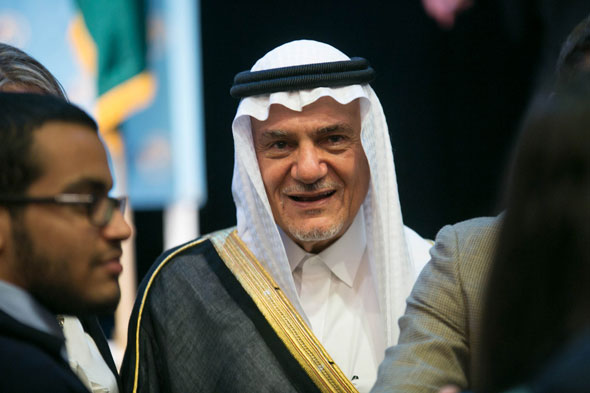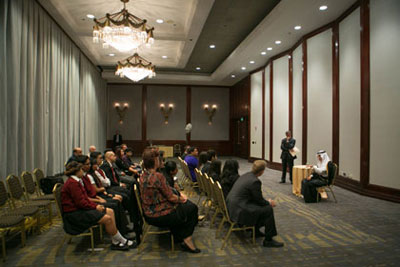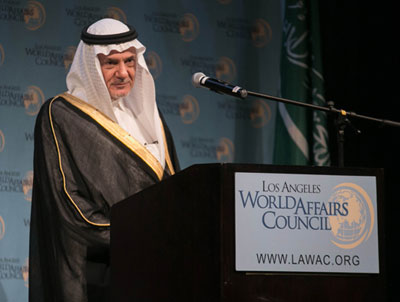
Diplomacy alone will not end the bloody civil war in Syria, it will require military aid to the opponents of President Assad, according to Prince Turki bin Faisal al Saud. And the costs of not arming the opposition will mount, with increasing deaths in Syria, and the possibility of the conflict spilling over into Lebanon, Turkey, Jordan and even Israel. “Bashar al Assad’s military superiority is what is prolonging the conflict – supplying arms to the opposition is what will bring about military parity that will lead to a political solution,” said Prince Turki, who was the head of Saudi Arabia’s foreign intelligence service for almost 25 years.

Prince Turki speaking to public high school students
The Middle East, he said, “has entered a period of profound change,” with governments collapsing and political, economic and military turmoil widespread. “A reassessment of all policy angles is needed.” Prince Turki also criticized Iran – long a bugbear of Saudi Arabia – for what he said was its “interference” in other countries’ affairs in the region, and he challenged the widespread notion that private Saudi money went into supporting ISIS and other extremist groups.
“In Syria a society sits on an abyss of nightmarish internecine warfare, which could spin into neighboring countries – the government seems to be bent on bringing merciless bloodshed to its own people,” he said, calling for military aid and training to the Syrian opposition to force Assad to the negotiating table. “We all know by now who the good guys and who the bad guys are in the opposition – dilly dallying is what allowed extremists to enter the fray back in 2011.” There is some urgency, he said – the longer one hesitates in arming a moderate opposition, the more space one leaves for terrorists to “fill the void... Delay [supplying arms] now and you will have to do much more when the carnage spreads to Lebanon, Israel, Jordan, Iraq and Turkey.” Already the Sunni extremist ISIS movement has spread from Syria into Iraq. ISIS was helped by the crudely sectarian policies of former Iraqi Prime Minister Nuri al Maliki, who alienated Sunnis in Iraq by favoring his own Shiite sect.

To put further pressure on the Assad regime, Prince Turki said that a no-fly zone should be created over the borders of Syria with Turkey and Jordan that would give the opposition some breathing room to get established and take the fight back to Assad’s forces. In the end, Assad must go, he said – only then could a reconciliation government be formed in Syria. As for Israel, Prince Turki said that “the need to solve the Palestinian-Israeli conflict is plain to see,” and blamed Israel for “ignoring all the peace proposals that have come, particularly from Saudi Arabia.”
Iran, said Prince Turki, was intervening in Syrian affairs by deploying members of its Republican Guard to fight with Assad, as well as sending its Hezbollah clients to join the fight. He also said Iran was giving support to the Houthi rebels in Yemen, opposition groups in Bahrain and Hamas in Gaza. “As long as Iran continues interfering in Arab affairs, relations will continue to be strained and belligerent,” he said. But he added that there were two things that ought to bring them together – “geography and religion… we are neighbors, we worship one God, we praise the same book… my hope is that those [things in common] will bear more weight than the differences.” But when asked about whether Saudi Arabia could find some accommodation with Iran, he said “there is no reluctance on the part of Saudi Arabia, but we need to see change in Iran by its conduct, not by its words.”
Finally he said that “to those who accuse Saudi Arabia of supporting ISIS, I say ‘put up or shut up’.” For some time Saudi Arabia, he said, has been going after any of its citizens who are found to be supporting terrorism, and prosecuting them. So anyone who has names of Saudis who are funding ISIS or other terror networks should simply come forward with their evidence. “Do not wag your fingers at us.”
The view from Washington and the view from Riyadh may be very different, but with common enemies in the form of ISIS and beyond, there is much urgent work that needs to be done together in the region.
